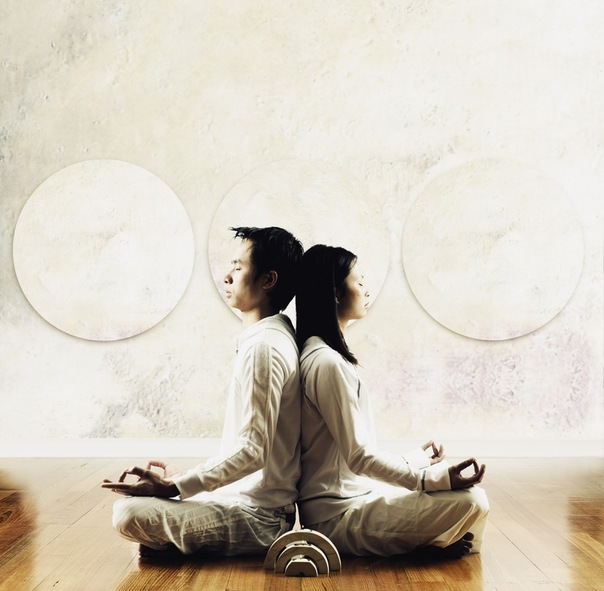If you’ve spent anytime doing yoga or practicing meditation, you’ve probably heard about tantra.
One of the oldest offshoots of Hinduism in the world, tantra has seen a renaissance in the last 40 years.
The ironic thing is although tantra has gotten a lot more attention recently, it’s also been greatly misunderstood; many people think tantra is either a sex practice or black magic.
The Meaning
The word tantra comes from the combination of two words: “tattva” and “mantra”.
Tattva is the science of cosmic principles, while mantra is the science of mystic sounds and vibrations.
This means that tantra is the application of cosmic science with the determination to attain a deeper spiritual connection.
The Big Misunderstanding
Unlike many other traditional religious perspectives, tantra takes the entire person into account- their worries, fears, and worldly desires.
Most teachings believe that the pursuit of material pleasures and spiritual aspirations are mutually exclusive; that is, they are in direct opposition to one another.
This gives rise to an inner struggle that can lead to lots of inner turmoil.
In tantra, instead of drawing a line between these two seemingly different impulses, it’s taught that a practitioner should embrace both.
Since tantra means “to weave”, many tantra masters teach life can only provide fulfillment when we follow the pattern designed by nature.
Anger, fear, attachment, and negative emotions tear the threads and causing the fabric to rip.
Tantra seeks to repair that fabric.
To the tantra practitioner, worldly experiences are the same as spiritual experiences- there is no difference.
This simple philosophy has led many to conclude that tantra encourages people to be indiscriminate in their worldly pursuits.
But in reality it’s a philosophy that encourages seeing the divine in everything, no matter how dark or materialistic.
They’re all the same.
Weaving the Fabric
Tantra isn’t a naive philosophy or world view in anyway.
It encompasses everything.
Even in the hardest of situations, there’s still room to notice the deeper meaning.
And ultimately, this leaves lots of room for a person to grow into their own understanding and how they fit into the world.
Tantra is an ancient Sanskrit word, meaning “to weave or to expand.” In tantric sex, we weave and expand our energy with our love partner, for the purpose of opening up to the entire universe. Shaped variously by Hindu and Buddhist traditions, sometimes constricted by Confucianism, Tantra in its widest meaning describes an approach to living that links the physical universe to the cosmic whole.
Sexuality, the most physical and intimate of human interactions, is thus seen a sacred activity, continuously reenacting the original creation of the universe. The First One, separating from Itself to know Itself, embracing Itself to experience Itself.
Tantra proposes that each one of us must undergo within ourselves this total union, a joining of the female and male within us. And when love partners dance the path of Tantra together, the relationship is transformed into a sacred journey to Oneness.
Tantra describes a movement of energy, a welling up within us, of joyous excitation. Unlike forms of meditation that cause us to withdraw from the world of senses, Tantra encourages us to start with the senses, building on their ability to focus us in the present moment.
This energy need not be explicitly sexual; all sensual experience is appreciated as a tool for awakening the energy within us. In the moment that we shift from overt physical pleasure to an internal joy, to a focus on the internal movement of energy, the subtle nature of our being is exposed and Tantra takes place. Nor does Tantra exclude experiences which are not overtly pleasurable; this same internal shift of focus can take place as we experience outward pain, even death.
Tantra occurs only in the present moment; yesterday’s experience has no relevance.
When I smell a rose, I smell it in this moment, not yesterday or tomorrow, but right now, right here. And if I embrace that moment of smelling the rose as the prelude to a spiritual experience, if I invite the rose-smelling into my total being, aware both of the scent and my total bodily response to the scent, aware of the softness of the petals and the rose energy in my heart, then in that moment I am open to the fullness of who I am. This is Tantra.
And if you and I both smell the rose together, and sharing that experience, dissolve our separateness into an infinite Oneness, then together we experience Tantra.
Tantra brings poetry to lovemaking. When my lover caresses my face and our eyes meet and we breathe together and acknowledge our rising passion, sense our hearts joining and our spirits soaring, the energy rising through the power centers of our bodies, this is Tantra.
Some spiritual paths teach us to deny, to say not this, not that; they teach that who we are is not the body, not the mind, not our actions, not our thoughts. Stripped of what we are not, these paths allow us to see the emergence of who we may be. Tantra takes the seemingly opposite approach and teaches us to say YES! to this, YES! to that. I smell the rose and I am that experience, my lover touches me and I am that experience, there is nothing that I am not, I am everything. All experience can be a doorway to who I am, provided I focus on the experience itself, with the intention of energetic awareness.
To learn and benefit deeply from Tantra, we must practice being still, undistracted. When I am smelling the rose, I smell the rose.
To make love in the Tantra way means to be fully present, to allow each moment to be the entire experience. In Tantric lovemaking, there is no goal, no race toward release or orgasm. Instead, there is complete attention to each touch, each breath, each movement of energy.
Every moment in our lives can be shaped by Tantra, can be lived in fullness and acceptance.
However, our minds, our thoughts, are constantly darting here and there. We are consumed with busy-ness, at our jobs, at school, taking care of our children, our home, our parents. Birthday parties. Thanksgiving, Christmas, weddings, funerals. We are bombarded by input from phone, TV, fax, e-mail and junk mail. Bills.
When we finally get away on vacation, often as not we’re busy skiing or snorkeling, eating, shopping, museuming, being transported from place to place.
Stop the World, I Want to Get Off! But first, I need a haircut, car wash, new blouse, shoe repair, show to see, and of course, those bills to pay. Our lives are structured around busy-ness, not around living in the moment.
While we are skiing, or snorkeling, or playing tennis, basketball, or golf, the world does disappear, leaving only the action of the sport. This is the attraction of athletics. It is a natural occurrence.
But how do we make time for a momentary tantric relationship with a flower, let alone an hour with our lover? How do we say Yes! to each moment, when the next moment is already here and then gone?
We need to do even more than make time to smell the roses. We need to learn how to let the scent permeate into our belly, deepening our breath and opening our heart to the expansiveness of spiritual experience.
Athletic pursuits require practice and training. They are designed to take place in a zone outside of daily living. Tantra provides us a way of living daily in that zone.
Tantra is being in the flow.
Being in the flow of all that is.
In the present moment.
Being in the flow,
of all that is in you.




